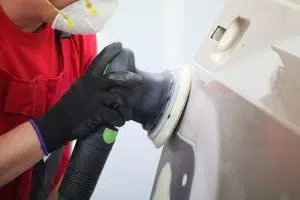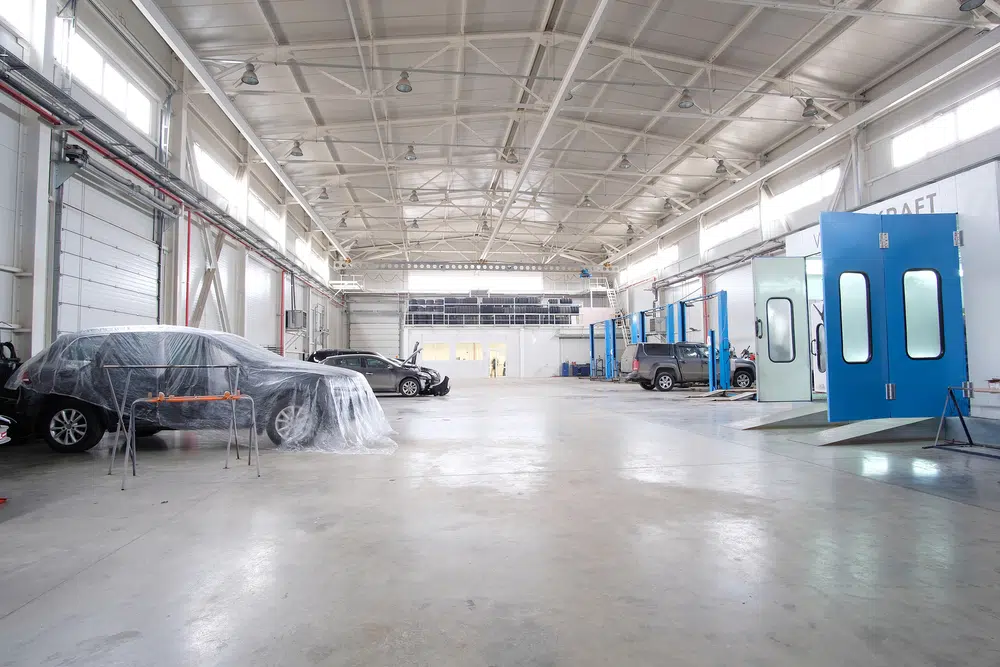
You’ll need to register with the Environment Agency as a waste carrier, and you’ll need to have a premises from which to operate. You’ll also need to invest in some basic equipment, such as an industrial oven, welding equipment and a spray booth. Of course, you’ll also need to have a good understanding of cars and repairs. Once you’ve sorted out the legalities and set up your business, you’ll need to start marketing your services.
You can do this by putting up flyers in local garages and car parks, or by advertising in local directories. You could also try setting up a website or blog to attract customers from further afield. Whatever marketing strategy you choose, make sure you let people know about your competitive prices and your quality service. With a little effort, you should soon have your car bodyshop repair business up and running smoothly.
Body shops repair damage from accidents, respray entire vehicles, and modify vehicles to meet a customer’s needs. Start up and run your own car bodyshop business venture with our simple yet informative guide.
Estimating demand
In order to start a car body shop in your area, you’ll need to make sure there is enough demand. It is a very competitive industry, and a number of companies provide body repair services, such as:
- Businesses located in large industrial units and sole traders with no employees)
- Workshops owned by insurance companies
- Mobile SMART repair (small to medium area repair techniques) businesses, including those that are part of a franchise network such as ChipsAway
- Motor dealers with franchises (main dealers)
- Dealers in second-hand cars
- Breakers yards offering panel and glass replacement services
To find out how many other businesses in your area already provide car body repairs, check out the competition.
Depending on your target market or the services you offer, you may only have direct competition with a few of these outlets.
Find out what people want
Since there will be strong competition, you need to find out what people want and whether there are any special services you can offer to attract them. You should keep in mind that your local survey may include customers from other businesses such as vehicle rental companies, taxi companies, driving schools, and car dealers.
Why will people choose your car bodyshop?
In order to succeed in your business, you will have to make sure that enough people choose you over your competitors.
Repairing accident-damaged vehicles is likely to be a large part of your work. Insurance companies often pay for these repairs, directing customers to their approved repairers. Minor repairs are sometimes paid for by drivers themselves rather than losing a valuable no-claims discount.
There will also be work that’s not accident-related, such as corroded panels repaired on an MOT failure or a vehicle being prepared for sale.
Additionally, you might get work from drivers who want to customise the appearance of their car with a body kit, rear spoiler, different lights or special paintwork. Nowadays, many drivers spend a great deal of money on improving the performance and appearance of their cars.
Make sure your prices are competitive with other local repair shops, as many customers will choose a bodyshop based on price. A potential customer will also consider other factors such as your reputation, training, service level, convenience, and reliability in addition to price.
It might be a good idea for you to join an insurance company approval scheme, which will provide you with a steady supply of work. Alternatively, you may have found a market gap you can fill as a result of your market research. The restoration of older vehicles may not be available in your area, for example.
No matter what type of work you specialise in, emphasise the quality of your work. Your business will be shown to be run to a high standard by joining a trade association quality scheme. In the same way, a friendly and knowledgeable approach will inspire confidence in potential clients. It is common for independent repair shop employees to be passionate about cars, and they are happy to share their knowledge and advice with customers.
The ability to understand automobiles, repair techniques, modifications, etc., is an important skill. Take advantage of these strengths and make sure that your customers know what you can offer in terms of expertise and personal service and offer a free valeting service.
Establish your customer profiles
Your market
Most accident repair work comes from insurance companies, although you may also receive direct work from vehicle owners if you are a member of an insurance company approved repairer program. A customer may also be an owner of an older vehicle that needs structural repairs to pass the MOT test or an older vehicle that needs attention before it is sold. The restoration of classic vehicles or the replacement of convertible hoods may become the main source of income for specialists in this field.
In addition to private drivers, you may also work for driving schools, taxi and minicab companies, and vehicle rental businesses. It may also be worthwhile contacting organisations such as universities, colleges, hospitals and local authorities that own their own fleets.
Special offers and discounts
Any regular trade customers may be offered a standard discount as a matter of course. Pricing policy and local competition will determine how much discount you offer.
Employees, regular customers, family and friends are also often offered discounts by businesses. Pensioners or members of classic car clubs could receive a reduced rate. Keep an eye on any special offers you make to ensure that they are working for you. You can get ideas from the local opposition. Promotions like these might increase your business, but they will also affect your profit margins.
Decide which car repair services to offer
What range of work will you do
The largest source of business for body shops is accident repairs. Small repairs like repainting a scratched door panel or knocking out a dented wing may be done, while large rebuilding jobs such as straightening a crashed car’s body shell might be handled using hydraulic jigs. When performing MOTs on older vehicles, some companies repair corroded areas. There are also companies that provide paint spraying services and restore classic cars. In addition to providing these services, many bodyshops also perform mechanical work, such as steering and suspension work.
Specialist services
A specialist service could fill a market gap you identified through your market research. In some places (rural areas, for instance, where the population density is low), you may need to offer a wide range of services before you can specialise.
Specialising can help you differentiate your business from your competitors and help you compete effectively in many cases. Perhaps there is no one in your area who specialises in classic car restorations. As a result, not many bodyshops are willing to take on work of this type due to the complex nature of the work requiring specialised skills and training. However, restoration work is often a long-term job, and disputes over the final bill are quite common. In spite of this, classic cars of all varieties remain popular in the UK, with restoration services in high demand. Many restoration workshops have waiting lists of customers’ cars.
Body-kits, spoilers, and other modifications are also very popular in the modified car scene. There is also a growing demand for specialised paint jobs. Younger drivers, in particular, are willing to spend a lot of money on customising their cars. Extra income could be generated by tapping into this trend.
Providing convertible roof repairs or replacements is another specialty service you can offer. Many convertible cars in the 1990s featured fabric hoods instead of folding metal roofs that are more common in modern convertibles. Many of these need to have their hoods replaced. There are not too many independent bodyshops that offer this service, so it could be a good source of extra work.
Additional services
The following additional services could be offered as well as car body repairs:
- Tow bar installation
- Car valeting
- The use of SMART repair techniques (small to medium area repairs) on paintwork, windscreen cracks, etc.
- Repairs to upholstery and interior trim
- The provision of accident recovery services (this might bring in extra work, but it would require an appropriately equipped vehicle)
- Offering a courtesy car while a customer’s car is being repaired – although you won’t make money from this service, it may be a reason for new customers to choose your business
Promote your car bodyshop
The right image
First impressions of a business are often influenced by the way it looks, so it’s vital to present the right image. If necessary, repaint your premises to brighten them up. If possible, provide a separate reception and waiting area where customers can chat and sit while waiting to collect their cars without having to breathe paint fumes. It might be a good idea to install a drinks machine.
Tow trucks will be highly visible advertisements for your business if you operate a recovery service. Keep it looking smart and well maintained, even if it isn’t new. It should clearly display your logo and livery.
Good service
The attitude shown to customers is even more important than the appearance. Many people associate garages with poor service and patronising behaviour. You can create a good impression by treating customers in a friendly, helpful, and polite manner. A good reputation can only be built over time, but you should strive from the start to provide a high level of service and satisfy your customers.
Respond promptly and politely to all questions and complaints. Estimate carefully and contact the customer before starting work that wasn’t originally budgeted.
Quality standards
The key to attracting and retaining customers is to maintain high standards. Many trade associations operate quality assurance schemes that set strict standards for their members, as do insurance companies. The following schemes are available:
- BSi Kitemark
- The National Body Repair Association (NBRA)Code of Practice
- IMI Accreditation
You may have to undergo training and meet set standards before your business can display the NBRA sign or become an IMI accredited technician. The effort is worth it – such a status demonstrates to potential customers that the company offers a high level of service. In addition, the IMI and NBRA operate online directories, which enable potential customers to search for member businesses in their area. Their websites provide more information.
Consider becoming a member of the FOXY Lady Drivers Club, which operates a network of female-friendly garages and accident repair centres.
Advertising your car bodyshop
Your business needs to be advertised so that potential customers are aware of what you do and what you offer. To promote your business, you can do the following:
- Keep passing trade informed and attracted by external signs
- Include your business in your local newspaper and any local directories (emphasise any unusual services you offer or features that set you apart from your competitors).
- If you offer restoration services, advertise in classic car magazines
- If you offer specialist services that are not easily found elsewhere, launch your own website to reach a wider audience
- Inform local driving schools and taxi companies about your services and pricing
When your business becomes established, you will probably have a large amount of repeat business and many new customers from word-of-mouth recommendations.
Insurance company approval schemes
The majority of insurance companies provide their policyholders with a list of approved repairers. It is usually required that the insurance company receives an estimate of the cost of repairs before they will pay for the job to be done by a repairer outside of this network. A courtesy car is often provided for the customer to use while the damaged car is collected by the insurance company.
A steady stream of accident repair work is likely to be guaranteed if you join an insurance company’s approved repairer scheme. Assessors will attempt to keep costs as low as possible regardless of the rate of pay offered by the insurance company. Consequently, this type of work can yield small profits.
For information about joining an approved repairer scheme, contact the insurance companies directly.
Small body repair businesses have been accused of anti-competitive behaviour by some insurance companies. NBRA reports the following aggressive practices:
- The insurance company chooses the workshop, not the customer, for the work to be performed
- Calculating labour rates and times
- Providing free or discounted parts, paint, and materials to the repairer
- Specifying certain suppliers to be used
- Insisting on the use of particular computerised estimating systems, equipment, and machinery
Price your car bodyshop services
You must be able to cover your costs, overhead, and drawings when considering your pricing policy.
How you set out your prices
Insurance companies usually pay for repairs to accident-damaged cars. An assessor will be sent to check that the appropriate work is being done and that the insurance company is not being overcharged, unless you are part of an approved repairer scheme.
Replacement panels, paint, and so on are usually itemised along with a separate labour charge on car repair bills.
Parts
Customers are usually charged for parts based on the cost price of the parts increased by a certain amount. (Most businesses add 15% or 20%.)
Labour
Depending on how long it takes you to complete the job and the hourly rate charged, you will be charged labour. If you are interested in finding out what the typical rate is in your area, you can check out the local competition. The insurance company usually pays hourly rates based on manufacturers’ times for work obtained through membership in an approved repairer scheme.
You decide what to charge for other work. If your job is simple, you may decide on a set fee, such as replacing a windscreen, repainting a bonnet or wing or repairing a few small areas of corrosion or accident damage.
It is usually necessary to assess each job as it comes in, and to agree on a price with the customer beforehand. When it comes to accident repairs, this is likely to be the only practical approach. Estimating the extent of the work required and setting a fair price require experience. Let your customers know that the prices you quote are estimates, which may increase to a certain extent if problems arise. Before embarking on any additional work not originally budgeted, be sure to get the customer’s approval first.
If you intend to restore a classic car, you should be particularly cautious. Many disputes occur because it is impossible to determine the amount of work required (and therefore the cost) until the car is completely dismantled. Under the surface of a sound looking vehicle, extensive corrosion may hide a can of worms.
Maintain regular communication with customers about the progress of the restoration to avoid misunderstandings when making estimates. Before undertaking potentially costly work that wasn’t included in the original estimate, it’s wise to check with the customer.
Other services
If you provide other services (such as breakdown recovery or courtesy cars), consider how often you will review your prices and whether you will give discounts, such as reduced rates for trade customers.
Buy an existing car bodyshop
Instead of starting from scratch, you may decide to buy an existing car bodyshop. Going concerns can include products, customers, regular sales, staff, premises, and workshop equipment.
It is risky and expensive to buy a business unless you have the right legal and financial expertise on your team. Make sure the price you pay for the business is a reasonable one based on the business’s real trading and financial position.
Jarred Musson is a versatile writer with a diverse educational background and a passion for all things business. Holding a Master of Science (MSc) degree in Marketing and a Bachelor of Arts (BA Hons) in Multimedia Journalism from Manchester Metropolitan University, Jarred possesses a unique blend of expertise that allows him to dissect and communicate complex business topics with clarity and precision.


